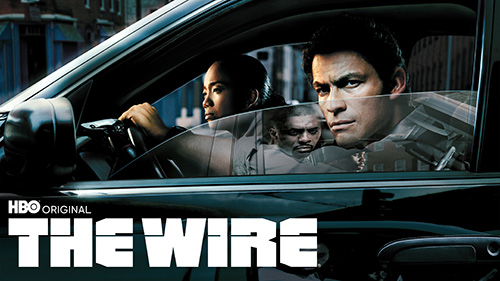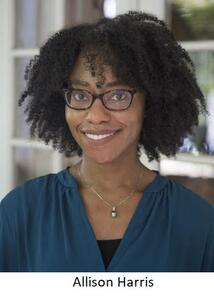The Politics of HBO’s ‘The Wire’: Uncovering Urban Realities

In the very first scene of the very first episode of HBO’s groundbreaking TV series “The Wire,” a character explains why he and his companions allowed someone to play a weekly craps game in the alley with them even though he would grab the money and run away — every time.
“Got to,” the character said. “This America, man.”
The statement serves as an introduction and a summary of the entire show, which over five seasons from 2002 to 2008 chronicled the rules of the game within the broken institutions of Baltimore, as an example of the modern American city. It also serves as something of a rationale for a popular spring semester course taught by Institution for Social and Policy Studies (ISPS) faculty fellow and Assistant Professor of Political Science Professor Allison Harris, “The Politics of HBO’s ‘The Wire.’”
“This show offers an excellent opportunity to investigate cities, their problems, and their politics,” said Harris, an assistant professor of political science. “My goal is for students to enjoy the show and its deeply resonant and enduring themes while learning about how social scientists ask and attempt to answer questions that help us better understand the world around us.”
At ISPS, Harris conducts research in American politics with a specialization in law and courts and the ways in which institutional change affects disparities in institutional outcomes. With Dara Strolovitch, professor of women’s, gender, and sexuality studies and political science, she directs the ISPS Center for the Study of Inequality. Recently, they have created a working group for political science graduate students conducting research on a variety of types of inequality and in a variety of contexts. This group meets regularly throughout the year so that students can share their research in progress, receive feedback, and be part of a supportive group of scholars with overlapping interests.
Harris’s course on “The Wire” includes academic and journalistic readings on the war on drugs, policing, bureaucracy, deindustrialization, crime and prosecution, poverty, education, and media. It is heavily influenced by a syllabus for a course on the show’s politics and policy insights, created by Katherine Levine Einstein and David Glick of Boston University.
“I try to strike a balance between talking about the show and linking it to the concepts we want students to learn,” Harris said. “I make very clear to students that this is not a film studies class. We are not dissecting the show as a piece of art, though that is also a worthwhile avenue.”
Before “The Wire,” a lot of TV shows offered a simplistic portrayal of crime, where police and lawyers are always good and criminals are always evil, Harris said, noting that this show helped shift that approach.
“We know there is corruption in government,” she said. “And local governments are even more susceptible to corruption. ‘The Wire’ doesn’t portray anyone as all good or all bad. It tells the more complicated story of life in America.”
Primarily created by former Baltimore reporter David Simon, “The Wire” earned critical praise for its novelistic approach to television, examining various aspects of urban life through a vast and at-the-time mostly not-widely known cast of mostly Black actors. Many fans, like Harris, did not watch in its initial run on HBO but binged episodes on DVD and streaming services as its reputation grew and helped launch the careers of actors Michael B. Jordan, Idris Elba, and the late Michael K. Williams.
August Rios, ’26, said he was among the 10 people in his 15-student discussion section who had not seen the show before taking the class this past spring. An urban studies major, he has recommended the class to others.
“It was interesting to learn the implications beyond the show itself,” Rios said. “I enjoyed it as a look inside the American city. Truth versus a media portrayal.”
The show tells the stories of youthful members of the street-level drug trade, the machinations of the leaders of their organization, the police officers tasked with surveilling them, prosecutors, judges, the police hierarchy and the politicians they answer to, and a constellation of drug users, dock workers, lawyers, teachers, and social workers.
“It’s so interesting to see this portrayal of historical and ongoing segregation among communities of color,” said Kassandra Navarrete, ’25. “It’s like ‘Crime and Punishment’ in a U.S. city.”
Harris said the show and her research have led her to think more about how institutions affect individual interactions in the criminal justice system, as the decisions a police commissioner makes — influenced by career goals or who might owe whom a favor — can trickle down to an officer on the beat and how that officer interacts with a citizen.
“I used to think about one-on-one interactions: a police officer pulling over a driver for a moving violation, someone dealing with a clerk at the DMV,” Harris said. “Now I think about what happens even before an individual meeting and what influences that interaction.”
She talks in class about how police can be both ever-present and absent in low-income, urban communities. And how everyone in government and policing are human, susceptible to many kinds of influences.
“I want my students to think about what it means to be a member of any type of organization,” Harris said. “What commitments do individuals have depending on where they are situated within that institution? How does the person above you affect how you do your job? What are the constraints on your behavior? And who does the person above you answer to? In these ways, how might the job of a beat cop be like that of a runner in a drug organization?”
This past year’s class featured a Zoom appearance from Domenick Lombardozzi, the actor who portrayed the simple-minded police detective Herc. She hopes to arrange a panel with others involved in the production, perhaps in concert with Boston University’s class.
As entertaining as the show can be, Harris recommends her students watch the show over semester break.
“This show is a hard watch,” she said. “It’s a great show, but I recommend students take some breathers. Watch something a little lighter.”
Fortunately, they have plenty of options to feed all types of interests and desires, high and low. After all, this is America.